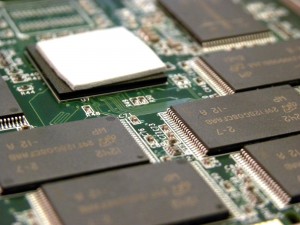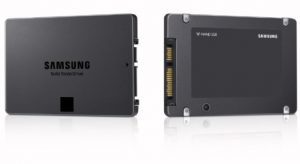Solid-state drives (SSDs) are often considered more reliable than conventional hard drives — and there’s some truth to that.

An SSD’s internal NAND chips and controller.
Hard disk drives (HDDs) have moving mechanical components, so they’re much more susceptible to physical damage than SSDs. But both storage technologies are prone to electrical damage, and both have limited lifespans — no storage device can offer perfect reliability.
And while SSDs don’t have moving parts, they still require appropriate operating conditions. That brings us to the subject of today’s article: how heat affects solid-state storage.
All SSDs are rated for specific ranges of operating temperatures.
Those temperatures range by manufacturer, but most recommended operating parameters max out around 158ºF (70ºC).
Generally, an SSD runs much cooler during normal operation — somewhere between 86-122ºF (30-50ºC). That’s fairly similar to the operating parameters of a conventional HDD.
Related: SSD Lifespans: How Long Can You Trust Your Solid-State Drive?
Why do SSDs get so hot?
Flash memory uses electricity to store data, and electric energy generates heat.

A Samsung SSD.
If an SSD operates constantly (for example, if you’re moving large files), it will build up thermal energy. Generally, the faster the SSD, the more heat — but manufacturers are certainly aware of this issue.
SSDs are able to dissipate excess heat through their chassis. Most computers also have internal fans to push out hot air, though you’ll need to give your fan enough clearance to do its work. More on that in a moment.
Related: How to Check Your SSD or HDD Health in Windows 11
So, what happens if an SSD runs hot for a long period of time?
As long as it’s within the recommended parameters, nothing bad will happen. SSDs are actually designed to run fairly hot, and flash memory can read and write data slightly more efficiently when warm.
The bottom line: If you haven’t noticed any performance issues, a hot SSD is nothing to worry about.
If an SSD runs too hot for too long, that’s another story. SSDs write data in floating gates, and high temperatures may weaken the tunnel oxide that holds electrons in those floating gates. This leads to a higher number of bit errors, which eventually become uncorrectable (the drive becomes less capable of retaining data).
Performance problems may start to occur when a drive consistently operates out-of-spec. Excessive temperatures (over 70ºC) can reduce performance and cause the SSD to wear out prematurely.
For consumer-grade media, this is unlikely; thermal issues are more common for SSDs used in data centers and other high-performance applications.
But for personal computer users, the SSD’s controller may be a more significant concern. If the controller fails due to high temperatures, the SSD can’t communicate efficiently with your computer. That can cause a variety of issues:
- Read/write speeds may be extremely slow.
- Your computer may not recognize the SSD.
- Files on the SSD may appear corrupt or unreadable.
Most operating systems have built-in protections that prevent overheating. Unfortunately, those protections aren’t 100% foolproof — and data loss can certainly occur due to thermal regulation issues.
Related: Solid-State Drive (SSD) Data Recovery: Are My Files Lost Forever?
Make sure your computer’s cooling system is functional.
To reiterate, SSDs are designed to “run hot.” However, you can (and should) take simple steps to make sure that excess heat can dissipate properly:
- Make sure that your computer’s thermal fans are clear and unobstructed. Turn your computer off before inspecting the fans.
- Compressed air works well for clearing out fans. If you’re cleaning a fan in a computer’s case, open the case to make sure you’re blowing dust away from your computer. Read the instructions on the bottle (and review your computer’s manual, if applicable) before you start.
- Give your computer enough space to breathe. Avoid placing your computer against a wall or on carpeted flooring.
- If your computer warns you about heat issues, take the warning seriously. Turn the computer off immediately until you can locate the source of the problem.
Finally, back up your data. SSDs are reliable, but every storage device fails eventually. If you keep at least two backups of important files (including one offsite backup), you can avoid a data loss disaster.
If you’ve lost data from an SSD, hard drive, or any other device, we’re here to help. Datarecovery.com provides a no data, no charge guarantee and risk-free media evaluations. To get started, submit a case online or call us at 1-800-237-4200.





